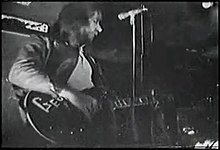Lobby Loyde | |
|---|---|
 Lobby Loyde performing "G.O.D." ABC-TV's GTK, 21 July 1971 | |
| Background information | |
| Birth name | John Baslington Lyde |
| Also known as | John Barrie Lyde, Barry Lyde, Lobby Lyde |
| Born | 18 May 1941 Longreach, Queensland, Australia |
| Origin | Brisbane, Queensland, Australia |
| Died | 21 April 2007 (aged 65) Box Hill, Victoria, Australia |
| Genres | R&B, rock, psychedelic rock, hard rock, blues |
| Occupations |
|
| Instrument(s) | Guitar, bass guitar, piano |
| Years active | 1959–2006 |
| Labels | Soundtrack, Sunshine, Festival, Infinity |
Lobby Loyde (born John Baslington Lyde, 18 May 1941 – 21 April 2007), also known as John Barrie Lyde or Barry Lyde, was an Australian rock music guitarist, songwriter and producer.
He was a member of two 1960s groups: Purple Hearts, which had a Top 40 hit with "Early in the Morning" in 1966, and Wild Cherries with their hit "That's Life" in 1967. He became a leading figure in the 1970s Australian pub rock scene, particularly as a member of Billy Thorpe & the Aztecs on their No. 8 album, The Hoax Is Over (1971) and Coloured Balls for a Top 20 album Ball Power (1973). He was briefly a member of Rose Tattoo during 1979 to 1980. His solo work includes the psychedelic album, Plays with George Guitar (1971) and the space opera, Beyond Morgia: The Labyrinths of Klimster (2007).
Known for his plectrum guitar technique, Loyde inspired a legion of Australian musicians, and was also cited as an influence by international musicians such as Kurt Cobain and Henry Rollins.[1][2] He was inducted into the ARIA Hall of Fame in 2006 where his Rose Tattoo band mate, Angry Anderson acknowledged his prowess, "More than anyone else, Lobby helped create the Australian guitar sound, long before Angus [Young] or Billy Thorpe or The Angels or Rose Tattoo. Lobby inspired Australian bands to step forward and play as loud and aggressively as they could. Loyde died of lung cancer in April 2007 and was survived by his children, Shane, Frances, Rebecca, Vyvyan and Lucinda, and his second wife Debbie Nankervis.